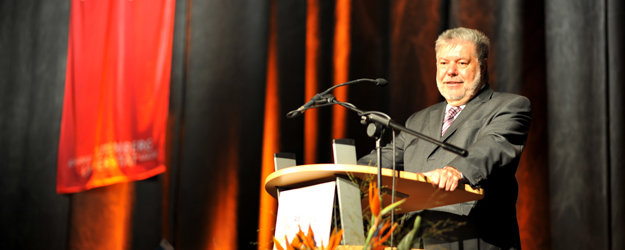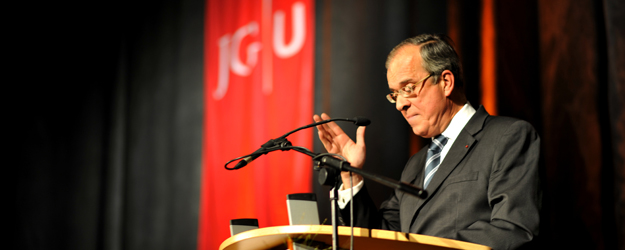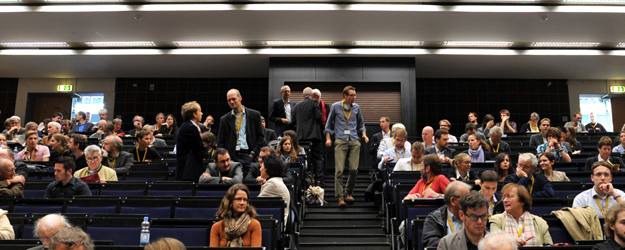11 October 2012
3,500 participants, 400 speakers, 99 dedicated helpers on site and two years' preparation time: the 49th German Historikertag (German Historians Conference) at Johannes Gutenberg University Mainz (JGU) turned out to be a major event. For four days, one of the largest European conferences for humanities scholars focused on the topic of "Resources – Conflicts" and much more.
It is all very colorful. Conference badges dangle from yellow bands, helpers wear black T-shirts saying "Who asks more gets there easier", and the logo of the 49th German Historikertag – a symbolic globe rendered in green and orange – can be seen everywhere in the Philosophicum building. There are booths offering specialist literature, a tent in the courtyard makes local history come alive, the German federal state of Rhineland-Palatinate presents itself in its many facets. There is hustle and bustle everywhere.
The German Association of Historians (VHD) and the German Association of History Teachers (VGD) had together invited participants to Johannes Gutenberg University Mainz. And the university’s Department of History did its level best to meet all expectations as a host. "We have been preparing since late 2010," says Dr. Heidrun Ochs, Director of the 2012 Historikertag.
Highly topical theme
The topic of this year's conference – "Resources – Conflicts" – is highly relevant. "Unequal access to resources was and still is a significant problem and is indeed something that triggers crises," stated Professor Dr. Werner Plumpe, Chairman of the VHD, at the opening ceremony. "Europe is currently experiencing this issue, which has become exacerbated and incalculable because it is concealed behind a monetary veil."
Many prominent people had come to the Electoral Palace in Mainz for the initiation of the 49th Historikertag. Not everyone chose to take a strictly earnest tone during the evening. The conference's patron, for one, Rhineland-Palatinate’s Minister-President Kurt Beck, recommended that participants might sample the local wine from Rhenish Hesse "in moderation." "This will bring us closer together and make us aware that it doesn't matter if our neighbor is from France or Rwanda. This is something we've learned here in Mainz."
France as a partner country
Beck had good reason to mention since the neighboring country was, in fact, the conference's partner country. "The institutional reconciliation of our countries began fifty years ago," recalled the French ambassador, Maurice Gourdault-Montagne. "That is why the Historikertag has, for the first time, entered into a partnership with a country."
"Politics is concerned with how things actually are," stated the diplomat. Historians, on the other hand, look at how things actually were. "The present may have a broad reach, but it is history that provides depth. Why should we only take the lateral viewpoint?"
"Plumbing the depths" – that would not have been a bad motto for the Historikertag. Four hundred speakers and 3,500 visitors came to the Philosophicum building the next morning to concentrate on the topic of resources and conflicts in the 68 panels and lectures over the next three days. The speakers talked about subjects such as Jews and Christians involved in conflicts, France's "hereditary enemy" and new friend, human trafficking in Europe, and water resources from antiquity to modern times.
A view of Europe from the outside
However, the Historikertag also dealt with topics that were not directly related to the main theme. The contribution "External Historical Views of Europe" turned out to be one of the most popular attractions. And as soon as the audience had grown to more than 100, Professor Heinz Duchhardt of Leibniz Institute of European History (IEG) in Mainz announced: "I'm afraid we'll have to move to another venue. We weren't expecting that so many would find this interesting."
Six experts gave talks in 30-minute intervals under Duchhardt's supervision. "Historically, Europe defined itself by means of separation," claimed Dr. Judith Becker of the Institute of European History. "Europeans considered themselves to be civilized and saw Africans as uncivilized; Europeans thought themselves clean while Arabs were seen as dirty." The outsiders, the foreigners, were seen as being of lower status; the benchmark of humanity was to be 'European'. "But now the time has come to listen to these others, to let them speak."
Disappointed African Christians
But there has never been an unadulterated view from the outside. It is usually the case that the culture viewing Europe had already long been under Europe's own influence. This of course shaped the particular viewpoint. Becker gave an example: "Africans recently converted to Christianity expected the Germans to conform to the standards that missionaries had taught them – and in this, the converts were naturally disappointed."
This aspect was the focus of the entire panel. Professor Dr. Stefan Rinke of the Latin American Institute of the Free University of Berlin talked about Latin America and its people who, around 1900, began to level a particular claim at Europe: "We are more European than you are." After the First World War, this self-confident attitude still prevailed: "Europe is old, but Latin America is young. It has its future ahead of it."
Deluded into being different
Three Africans, who came to Germany between 1890 and 1930, also had preconceived notions of the country and Europe as a whole before they arrived. This was the subject of PD Dr. Kirsten Rüther of the Department of History of Leibniz University Hannover. "They had to deal with a Europe that dominated them as a colonial power and laid claims to being progressive but also tempted them to be different."
Rüther criticized the fundamental categories with which researchers are working. Is there really an external view – or is it rather a debate with no clear delineation of external or internal? "Concepts must be put to the test."
Professor Dr. Georg Krausch, President of Johannes Gutenberg University Mainz, had said at the opening ceremony: "We are proud to be playing host to what is probably the most important conference for humanities scholars." And this festiveness soon gave way to the buzz of discourse and discussion in the panels and in the aisles between the booths of the various specialist publishers in the Philosophicum – and between participants taking a breath of fresh air in the courtyard.
This is the true spirit of such a conference. And the 49th German Historikertag on the JGU campus was indeed a success. Two years' hard work had paid off.



